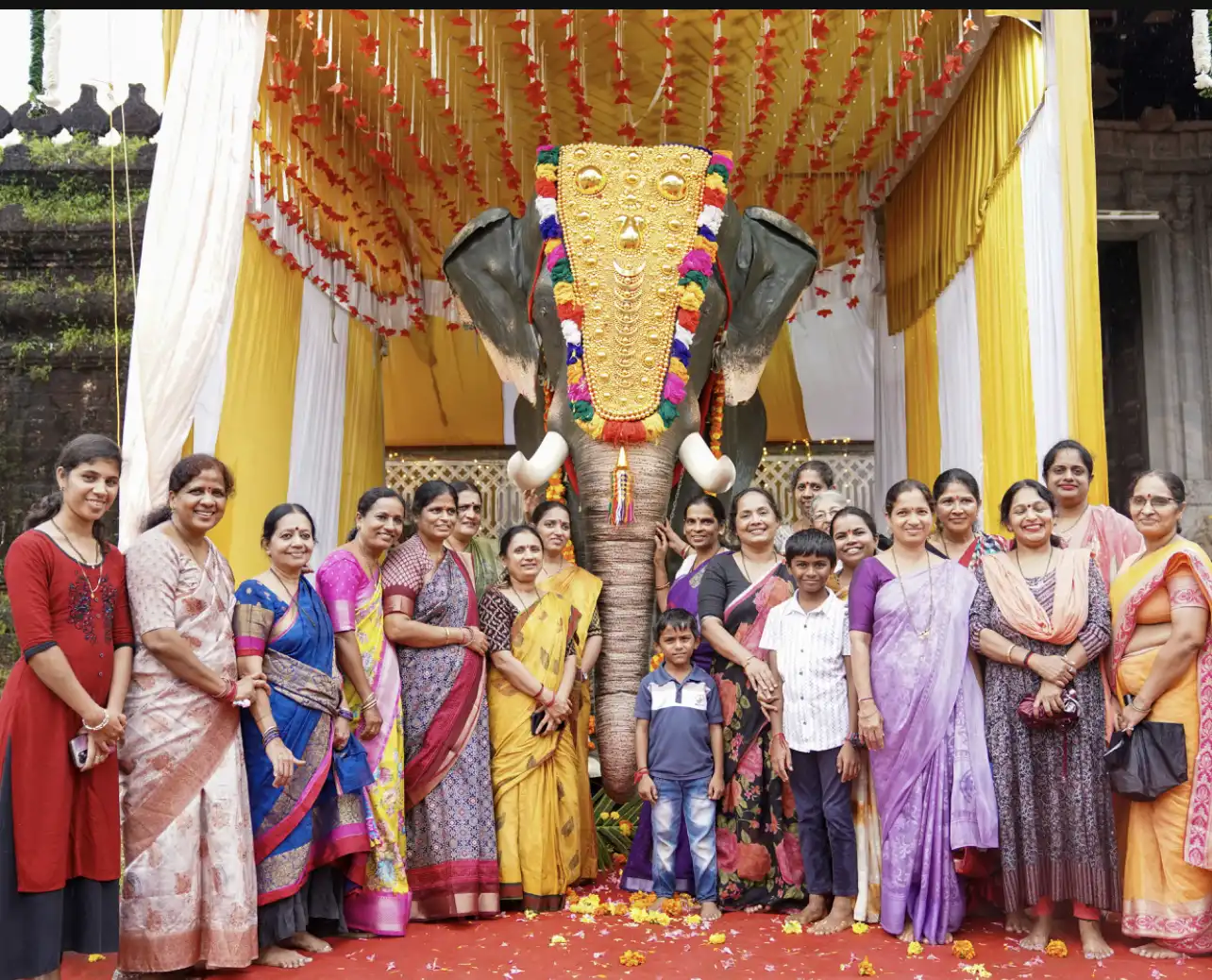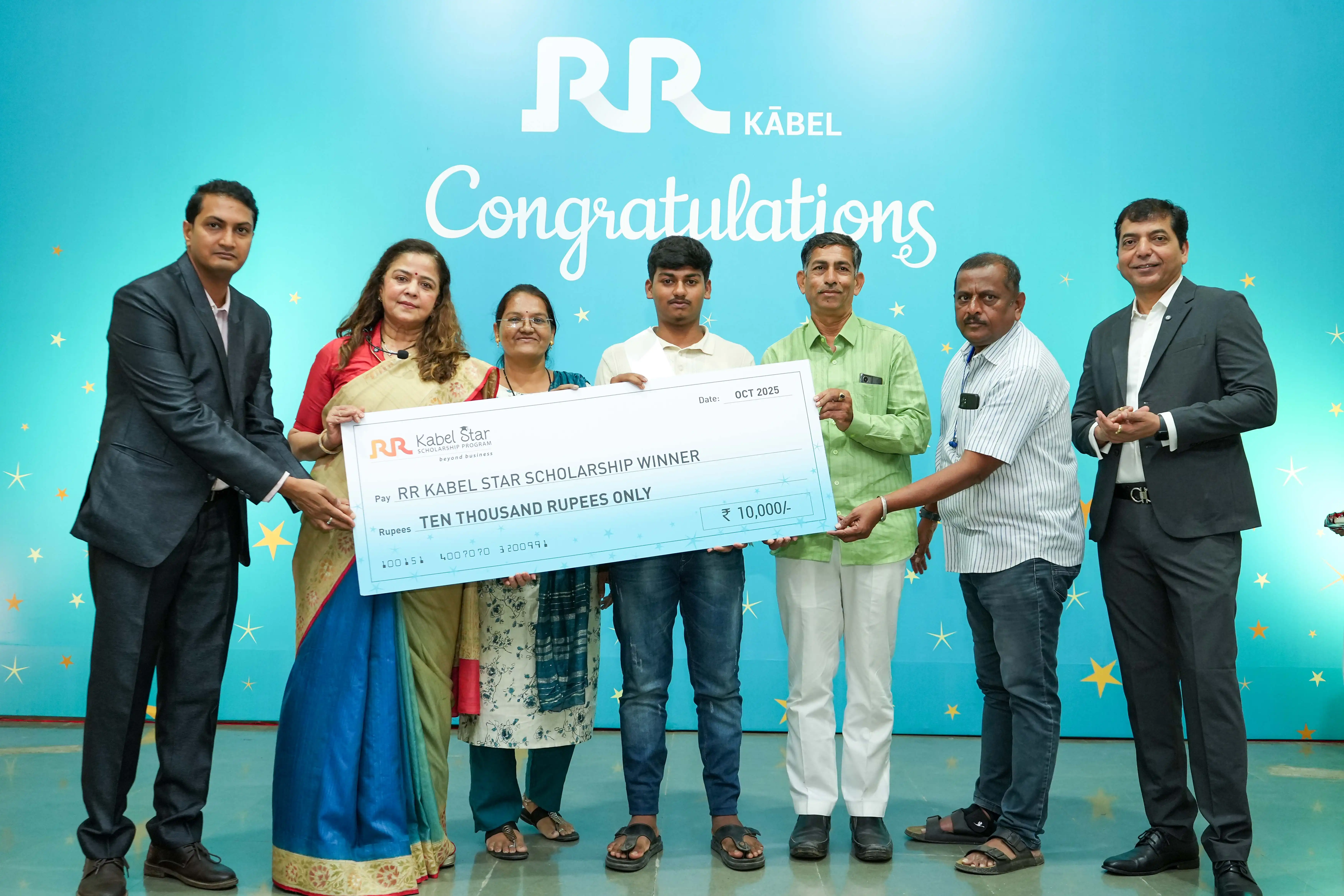Award-winning actor Raveena Tandon and daughter and actor Rasha Thadani, along with People for the Ethical Treatment of Animals India (PETA India), have donated a life-size mechanical elephant, Airavata, to Karnataka’s Thousand Pillars Jain Temple, located at Swasthi Sri Bhattaraka Bhavana in Moodabidri, in recognition of the temple’s decision never to own or hire live elephants. Today, on Moodbidri Swamiji Pattabhisheka’s Silver Jubilee year, Airavata was welcomed to the temple through an inauguration ceremony, followed by a Mangala Vadhyam performance. The Thousand Pillars Jain Temple becomes the first Jain temple in the world to have this technology. Airavata will be used to conduct ceremonies at the temple safely and cruelty-free, helping real elephants stay with their families in the jungle.
Raveena expressed, “I feel truly blessed to be part of this sacred transformation. Elephants have always held a special place in my heart, and offering Airavata, a mechanical elephant, to the Jain temple is my humble way to honour timeless traditions while keeping elephant families together.” Rasha Thadani stated, “It fills me with peace to know that we can uphold our culture without separating mother elephants from calves. I pray that Airavata inspires many to walk the path of kindness. After all, compassion is the purest form of religious observance.”
Celebrating the visionary initiative by PETA India to equip temples in Karnataka with mechanical elephants, the Chief Swamiji of The Thousand Pillars Jain Temple, His Holiness Swasthi Sri Dr Charukeerthi Bhattaraka Pattacharya Panditacharyavarya Maha Swamiji Sri Digambar Jainmath Moodbidri, says, “Welcoming Airavata into this sacred space fills my heart with immense happiness. We are reminded of Parasparopagraho Jivanam, the beautiful Jain principle that all life is interconnected and nourished through mutual care.” The Swamiji added, “This offering brings together the soul of our tradition and the spirit of compassion. I hope Airavata touches every devotee’s heart, inspires a deeper journey towards kindness, humility, and spiritual awakening, and gently leads us all on that radiant path of ahimsa and harmony.”
Elephants are intelligent, active, and gregarious wild animals. In captivity, they are trained to be used in processions through beatings, the use of weapons, and force. Captive elephants used for entertainment are often separated from their families and natural habitats. They endure harsh training methods and are controlled with ankuses—heavy batons tipped with sharp steel points—which instil fear and pain. Most elephants held captive in temples and other places suffer from excruciating foot problems and leg wounds due to chaining to concrete for hours on end. Most are denied adequate food, water, veterinary care, and any semblance of a natural life. Under these hellish conditions, many elephants become intensely frustrated and lash out, sometimes killing mahouts or other humans or animals. According to figures compiled by the Heritage Animal Task Force, captive elephants killed 526 people in Kerala in a 15-year period. Thechikkottukavu Ramachandran, who has been in captivity for about 40 years and is one of the most often used elephants in Kerala’s festival circuit, has reportedly killed 13 individuals – six mahouts, four women, and three elephants.

In 2025, at least twenty captive elephants in Kerala had become upset and killed six people on different occasions, injuring several others, or damaged property. It is also pertinent to note that in 2024, at least fourteen incidents across India in which captive elephants harmed or killed their mahouts or others around them were reported. And recently, elephants ran amok during the Rath Yatra in Ahmedabad.
PETA India ignited the sympathetic movement to replace live elephants in temples at the beginning of 2023. Now, at least twenty mechanical elephants are used in temples across South India. PETA India has donated twelve to recognise the temples’ decisions to never own or hire live elephants. Recently, another mechanical elephant was donated to Temples in Tamil Nadu by actor Trisha Krishnan and People for Cattle in India (PFCI). These mechanical elephants are now used to conduct ceremonies at their temples in a safe and cruelty-free manner, helping real elephants stay with their families in the jungle.
Mechanical elephants are 3 meters tall and weigh 800 kilograms. They are made with rubber, fibre, metal, mesh, foam, and steel and run on five motors. A mechanical elephant looks, feels, and can be used like a real elephant. It can shake its head, move its ears and eyes, swish its tail, lift its trunk, and even spray water. They can be climbed upon, and a seat can be affixed on the back. They can be operated simply by plugging in and playing with electricity. They can be taken through the streets and are mounted on a wheelbase, allowing them to be moved and pushed around for rituals and processions.
The Thousand Pillars Temple is the most prominent of the 18 Jain temples in Moodabidri, Karnataka, often called the ‘Jain Kashi’ of South India. Dedicated to Tirthankara Chandranatha, this 15th-century architectural marvel is famed for its thousand intricately carved pillars, no two of which are alike. Built in 1430 CE by local ruler Devaraya of the Vijayanagara Empire, and later renovated in 1962, the temple features three levels, seven mantapas, and a majestic 50-foot monolithic pillar (Mahasthambha). The sanctum houses an 8-foot idol of Chandranatha Swamy, crafted from five sacred metals (panchaloha), making it a revered center of Jain pilgrimage and heritage.





